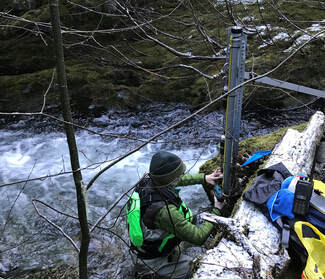 Hannah McSorley is a master’s student in the forWater Network. She’s studying water quality and surface water hydrology in a watershed where forest management is dedicated to source water protection. Her involvement in water science began during her undergraduate degree at Vancouver Island University (VIU) in the Applied Environmental Research Labs. Following graduation, she worked as a temporary water quality analyst with Environment and Climate Change Canada. “When my contract finished, I was looking to gain a new perspective on water quality through field-work,” said McSorley, which is why she secured a position as a research assistant for Dr. Bill Floyd – a research hydrologist with the BC government and VIU. While working with Dr. Floyd, McSorley had the opportunity to assist with the construction and maintenance of high elevation weather stations around the central and south coast of British Columbia and contributed to stream gauging and aqueous biogeochemistry research projects. Currently in the forWater project, McSorley works in co-operation with the Capital Regional District in the Leech River watershed, where she’s profiling changes in dissolved components during stormflow to better understand water quality in this rain-dominated riverine system. McSorley is using vertically staggered siphon bottles that passively collect discrete water samples at set stages of stormflow. “By capturing multiple water samples during stormflow, I can identify changes in water quality over relatively short time-frames and create a composite water quality profile of stormflow,” said McSorley. “Over the course of a year at multiple locations, stormflow profiles will provide valuable insight about water quality attributes across the gradient of disturbance in this recovering forest and can help to anticipate drinking water treatment requirements.” McSorley considers herself lucky to be engaged in the transdisciplinary research of the forWater Network. With a research background in environmental analytical chemistry as well as the field experience she has in hydrology, McSorley is able to tie terrestrial landscape to aqueous characteristics and view molecular-level water quality processes from the watershed scale. “I am learning a lot about water supply and forest management strategies, I'm studying hydrology and applying new knowledge in the field, and I continue to challenge and build my knowledge of water quality dynamics,” said McSorley. “I am incredibly grateful for the tangible and intellectual support I receive from the Capital Regional District, the forWater Network, from my supervisors at UBC and VIU, and for financial research support from the Natural Sciences and Engineering Research Council of Canada’s Graduate Scholarship Master’s Program.” Hannah McSorley is part of the forWater Pacific Maritime research platform, her co-supervisors are Dr. Mark Johnson (UBC) and Dr. Bill Floyd (VIU).
1 Comment
|
forWater NetworkThe Network provides insights into new scientific research for safe, secure drinking water---globally---which starts with resilient forests Archives
October 2023
Categories |


 RSS Feed
RSS Feed

